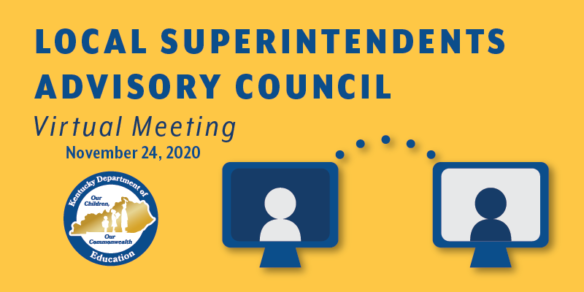
- Senate Bill 158 (2020) amends KRS 158.6455 to create an accountability system that includes an annual differentiation of all public schools in the state using multiple measures that describe each district’s overall performance, school and student demographic group.
- LSAC members felt they should table their recommendation on changes to Kentucky’s accountability system and schedule a special meeting to further discuss changes.
By Jacob Perkins
Jacob.perkins@education.ky.gov
Members of the Local Superintendents Advisory Council (LSAC) heard from Kentucky Department of Education (KDE) staff about recommended changes to Kentucky’s accountability system during their Nov. 24 virtual meeting.
The meeting came in advance of the Kentucky Board of Education’s (KBE) Dec. 2 meeting, where the board will review the recommendations made by the department.
Senate Bill (SB) 158 (2020) amends KRS 158.6455 to create an accountability system that includes an annual differentiation of all public schools in the state using multiple measures that describe each district’s overall performance, school and student demographic group.
SB 158 requires districts to be evaluated on “status” and “change” for state indicators, which include student assessment results, progress toward achieving English proficiency by English learners, quality of school climate and safety, high school graduation rates and postsecondary readiness.
For each indicator, there are five status levels ranging from very high to very low and five change levels, ranging from increased significantly to decreased significantly.
KDE staff have developed a 5 x 5 color-coded table that would combine both status and change. The colors represented on the table are – ranking from low to high – red, orange, yellow, green and blue.
KDE’s Office of Assessment and Accountability has sought feedback from various groups on this change to the accountability system, with the consensus being there should be fewer yellow – or mid-level – designations on the table. This would allow schools to better see change – good or bad – and reduce the likelihood of schools becoming stagnant.
While examining the table, LSAC member Tim Bobrowski, who serves as superintendent of Owsley County Schools, raised concerns over whether schools in high-poverty areas would be able to rise to the blue level, the highest designation on the table.
KDE Associate Commissioner Rhonda Sims said the blue level shouldn’t be the primary factor when determining success and that the blue and green levels can be viewed similarly to proficient and distinguished.
“Success in the system should be considered more broadly than just blue,” Sims said.
Even schools that are low in student outcomes but are still improving can find value in the yellow categories on the table, said Jennifer Stafford, director of KDE’s Division of Assessment and Accountability Support.
LSAC members also learned more about KDE’s recommendation on using colors to designate an overall performance rating for elementary, middle and high schools. This color system would replace the current star-rating system that was used to communicate school performance.
In the new system, red would represent the lowest rating and blue would represent the highest. Color ratings would have five performance levels including, from highest to lowest, blue, green, yellow, orange and red.
Additionally, LSAC members reviewed KDE’s recommendation that an index method with weights be used to combine performances on the multiple indicator measures, producing an overall school performance rating.
During the discussion, council members offered suggestions for how the weights could be distributed, including increasing the weight of postsecondary readiness at the high school level.
Seeking clarification for how assessment data would be included in the weights, LSAC member and Harrison County Superintendent Harry Burchett asked if KDE was expecting to factor in this spring’s assessment data given the disruptions in learning due to the COVID-19 pandemic.
“We don’t know. Balls are totally in the air at this point,” Sims said, explaining that the department is being told to prepare for assessments from the U.S. Department of Education.
“I think the way to think about this is we are trying to build the regulation as it should exist without COVID,” Sims added.
After discussing the federally allowed factors for English learners and how they can be incorporated for English learners into the state’s accountability system, and the minimum number of students needed for inclusion of school indicators and to form a student subgroup, LSAC members felt they should table their recommendation and schedule a special meeting to further discuss the changes to the accountability system.
The group agreed this would provide time for members to submit questions to KDE staff and review the presentation before submitting their recommendation to the KBE.
“We will work to make sure we address the questions you have and make sure you feel comfortable making a recommendation,” said Education Commissioner Jason E. Glass.
The LSAC scheduled a special meeting for 9:30 a.m. ET Dec. 1 to further discuss the changes.
In other business, the LSAC voted to:
- Approve an amendment to 702 KAR 5:080, bus drivers’ qualifications. The amendment cleans up language in the regulation relating to the termination process if a bus driver is found to be under the influence while on duty;
- Table an amendment to 707 KAR 1:340, Procedural Safeguards, for further discussion. With this amendment, sections 3 and 4 of the regulation will clarify the difference between an Admission and Release Committee (ARC) meeting notice and prior written notice. A meeting notice is a notice to parents or guardians that an ARC meeting will be scheduled. Prior written notice is a notice of proposed or refused action by the ARC. This amendment also would delete Section 18 from the regulation. Section 18 references the “Request for a Due Process Hearing” and incorporates it by reference, making it problematic to update the information on the form. Members voiced the need for further clarification;
- Approve the recommendation of new regulation 704 KAR 8:110, Kentucky Academic Standards for World Language. Staff from KDE’s Office of Teaching and Learning will present the draft standards to the KBE at its December meeting, but will continue receiving feedback from the department’s advisory groups, make final adjustments and create living, supporting resources for the standards as needed; and
- Approve a waiver to Kentucky Tech policy 08.5, Flagging Programs. The policy currently states that when a program no longer meets the needs of students and business and industry, it may be necessary to close the program and explore the possibility of opening a new one. Due to the pandemic, the council agreed it was currently not the time to evaluate enrollment in those programs.




Leave A Comment